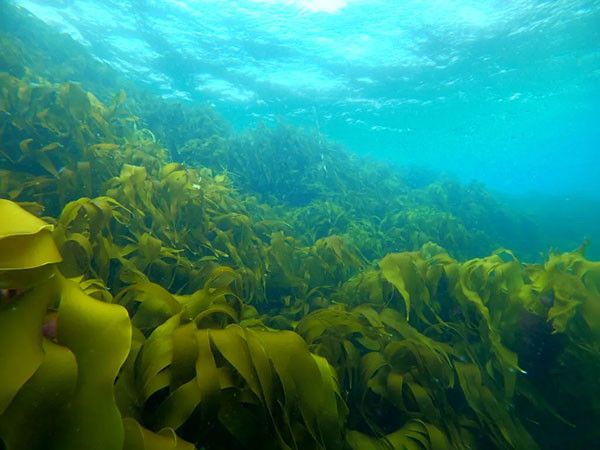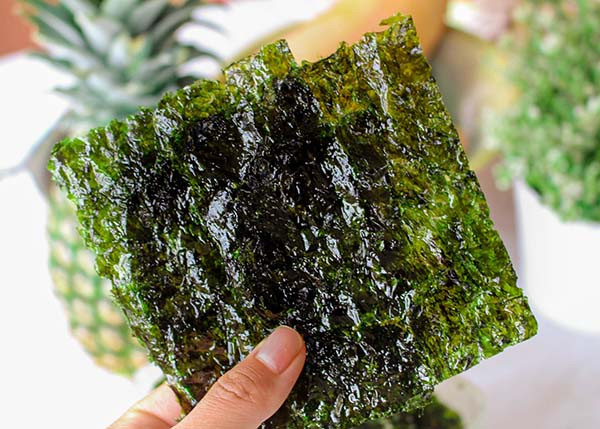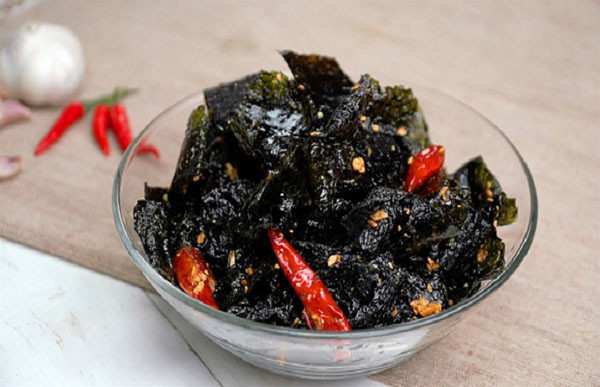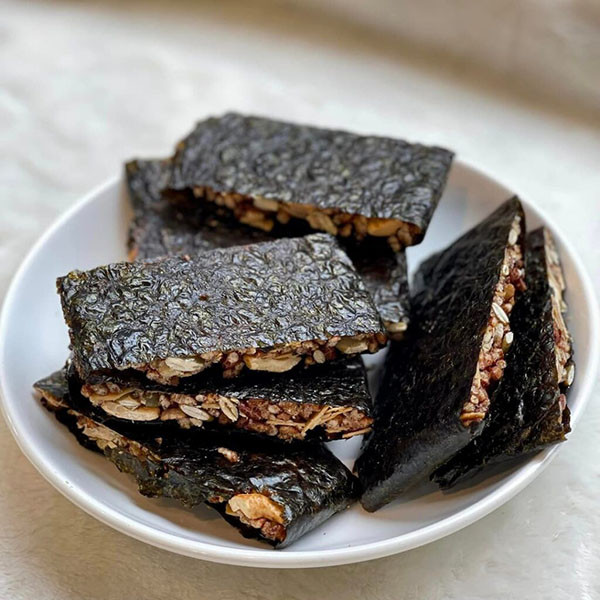Seaweed is a familiar food in many traditional Korean dishes and is increasingly popular in many countries, including Vietnam. With its high nutritional content, seaweed offers numerous health benefits. However, whether eating seaweed causes weight gain is still a concern for many people.
What is Seaweed? Origin – Characteristics
Origin of Seaweed
Seaweed is a type of marine plant belonging to the group of multicellular algae, related to brown algae, red algae, and green algae, but not sharing a common ancestor.
This type of plant has existed for thousands of years and has been used by humans for over 10,000 years. In ancient China, seaweed was once a valuable delicacy, appearing in the meals of kings and royalty.
Not only popular in Asia, seaweed is also widely harvested and used in many other regions such as the Pacific Islands and coastal South American countries, thanks to its rich nutrient source and outstanding health benefits.
Characteristics of Seaweed
Seaweed, also known as kelp, comes in a variety of colors, from red, dark brown to green. This plant thrives in both saltwater and brackish water environments, adapting well to locations such as rock faces, coral reefs, or in deep-water layers – where it still receives enough sunlight for photosynthesis.

How many calories are in seaweed? Does eating a lot make you fat?
Controlling calorie intake is an important principle for maintaining a healthy weight. Seaweed is a nutritious food, but does it contain a lot of calories? Does eating seaweed cause weight gain?
To determine the calorie content in seaweed, it’s necessary to first consider its weight and state (fresh or dried). According to research, fresh seaweed has a higher calorie content than dried seaweed. Specifically:
- 100g of dried seaweed contains approximately 34 – 35 calories.
- 100g of fresh seaweed contains approximately 50 calories.
Although there is a slight difference, seaweed generally does not contain too many calories. Therefore, you can comfortably prepare your favorite dishes from seaweed without worrying about gaining weight.

How many calories are in dried seaweed?
Dried seaweed is a nutrient-rich food, particularly suitable for those looking for healthy options for their diet and weight loss. According to USDA (United States Department of Agriculture) data, 100g of dried seaweed contains approximately 34 – 35 kcal, significantly lower than processed foods or snacks. Therefore, it is an ideal choice for people concerned with nutrition and weight management.
Not only is it low in calories, but dried seaweed also contains many important minerals and trace elements. Specifically, this food is rich in fiber, calcium, iodine, and essential vitamins such as vitamin C and vitamin K, which help support overall health.
Below are the typical nutrients found in 100g of dried seaweed, according to nutritional research:
- Protein: 5.81g
- Vitamin C: 39mg
- Fiber: 0.3g
- Calcium: 70mg
- Vitamin K: 25mg
- Potassium: 356mg
- Sodium: 48mg
- Iron: 1.8mg
- Phosphorus: 58mg
- Zinc: 1.05mg

Calorie content in garlic-fried seaweed
Fresh seaweed significantly reduces in weight after processing; approximately 100g of dried seaweed is obtained from 400g of fresh seaweed. On average, 100g of fresh seaweed contains about 45 calories, equivalent to 180 calories in 100g of dried seaweed.
However, garlic-fried seaweed is prepared with oil, garlic, and chili, so its calorie content is higher, estimated at about 210 calories/100g.
Many people worry that eating garlic-fried seaweed can lead to weight gain. In fact, any food consumed in excess can lead to a calorie surplus, causing weight gain. An adult typically needs about 2000 calories/day to maintain their weight. Eating garlic-fried seaweed will not cause weight gain if the total calorie intake does not exceed this amount.

How many calories are in nutritional seaweed snacks with nuts?
Dried seaweed is a nutrient-rich food with a low-calorie content. Specifically, 100g of dried seaweed contains approximately 43-45 calories, along with many important nutrients such as fiber, vitamins, fats, and essential minerals. When combined with nuts, nutritional seaweed snacks with nuts will provide about 70-80 calories/100g.
On average, one seaweed snack with nuts weighs about 20g, meaning you would need to eat 5 snacks to consume 70-80 calories. This is an insignificant amount of energy for the day, allowing you to diet without worrying about weight gain. Thanks to its natural ingredients and low oil content, it is an ideal healthy product for those who want to control their weight and follow an eat clean diet.
6 Amazing Health Benefits of Seaweed
Supports Healthy Thyroid Function
The thyroid gland plays a crucial role in controlling growth, energy production, reproduction, and cell repair. To function effectively, the thyroid needs iodine to synthesize hormones. Iodine deficiency can lead to fatigue, weight changes, and goiter. It is recommended that adults consume 140mcg of iodine daily.
Seaweed is a rich natural source of iodine from the ocean. Just one dried seaweed sheet can provide 1,989% of the RDI for iodine. The iodine content also varies depending on the type of seaweed:
- Nori: 25% RDI
- Wakame: 93% RDI
- Kombu Kelp: 1,682% RDI
Additionally, seaweed contains the amino acid tyrosine, which combines with iodine to produce thyroid hormones, supporting stable and healthy thyroid function.
Provides Vitamins and Minerals
Seaweed contains high levels of essential vitamins and minerals for the body. Specifically, 7 grams of dried spirulina provides:
- Calories: 20 kcal
- Carbohydrates: 1.7 grams
- Protein: 4 grams
- Fat: 0.5 grams
- Fiber: 0.3 grams
- Vitamins & Minerals:
- Riboflavin: 20% DV
- Thiamin: 14% DV
- Iron: 11% DV
- Manganese: 6% DV
- Copper: 47% DV
Seaweed also contains vitamins A, C, E, K, folate, zinc, calcium, magnesium, and sodium. Notably, 4 grams of nori seaweed provides 2.4 mcg of vitamin B12 (100% RDI) – a crucial nutrient for the nervous system and red blood cell production.
Rich in Antioxidants
Seaweed is rich in antioxidants such as vitamins A, C, E, flavonoids, and carotenoids. These compounds help protect cells from free radical damage, slow down the aging process, and prevent many chronic diseases.
Notably, brown seaweed (Wakame) contains fucoxanthin, an antioxidant 13.5 times more potent than vitamin E, which helps protect cell membranes more effectively than vitamin A.
Improves Gut Health
Seaweed is an excellent source of fiber, accounting for 25 – 75% of its dry weight, much higher than fruits and vegetables. The fiber in seaweed helps improve digestion and supports the growth of beneficial gut bacteria.
In addition, seaweed contains sulfated polysaccharides, a special type of sugar that enhances the production of short-chain fatty acids (SCFAs) – important nutrients that nourish the cells lining the gut, helping the digestive system function better.
Effective Weight Loss Support
Thanks to its low-calorie content and rich fiber, seaweed helps slow down digestion, creating a feeling of fullness for longer and reducing appetite.
Furthermore, animal studies show that fucoxanthin in seaweed may help reduce body fat, effectively supporting weight management.
Reduces Risk of Cardiovascular Disease
Seaweed helps reduce blood cholesterol, thereby limiting the risk of cardiovascular diseases.
Additionally, seaweed contains fucans, a type of carbohydrate that helps prevent excessive blood clotting. Some animal studies also indicate that peptides in seaweed may help stabilize blood pressure. However, more in-depth research is needed to confirm this benefit in humans.
We hope this article helps you understand how many calories are in seaweed, while also providing information on how to prepare seaweed correctly to support effective weight loss. Furthermore, choosing quality seaweed and preparing it using the right methods also plays a crucial role in helping you maximize the nutritional benefits this food offers.





